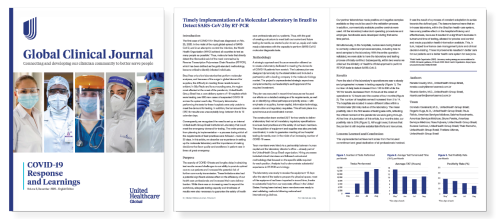What was the biggest challenge of navigating this rapidly evolving situation and how quickly were you able to pivot when presented with new guidance or information?
The biggest challenge navigating this rapidly evolving situation was a lack of validated evidence-based information globally. Many new articles and papers were being submitted globally every week to build the evidence base for COVID-19, however outcomes from these papers were often inconclusive or difficult to apply to the oil, gas and seismic industry. We adopted an approach that based our stance and guidance on published information from governmental agencies in the U.S., U.K. and Europe, while using global publication evidence to help shape the commonsense approach that was needed.
The primary drivers were the safety of our clinicians and the workforce they cared for, and outbreak prevention and control in the oil, gas and seismic sectors. The density of this workforce, combined with confined living quarters, increased the risk for the spread of any airborne disease.
The changing nature of COVID-19 testing created an additional challenge. With the support of the senior clinical management team, we were able to give proactive, balanced and consistent messaging about the evidence-based indications and limitations of diagnostic testing.
In understanding the scope of this pandemic and its requirements for maintaining safety, how would you approach future infection prevention and control (IPC) procedures to help ensure they could quickly evolve to emerging challenges?
The IPC procedures used for the COVID-19 pandemic are not new procedures or processes for clinical staff, however, they were novel for the general population, including this specific workforce. Good, basic IPC measures performed consistently and by everyone are the foundation of reducing spread and preventing outbreaks and clusters. We can expect future pandemics, and a key pillar of future management is whole populations taking ownership of IPC measures as individuals.
The concept of social distancing, reducing social contacts, good hand hygiene, isolating promptly if unwell and use of masks should be familiar and quickly implementable in future pandemics. COVID-19 has given the world a compulsory insight into living with a modern pandemic. IPC measures for airborne and fomite transmissible pathogens are universal and generic.
Future planning for oil, gas and seismic industry worker groups would include considering earlier use of PPE for clinicians, early identification and isolation of suspected cases, well defined generic isolation and contact tracing procedures, rapidly scalable PPE supply chains, rapid implementation of pre-mobilization screening tools for mobile workforces, safe travel advice and a continuous culture of personal infection control measures. Future outbreak management would also require established and tested medical evacuation transport systems. COVID-19 has catalyzed comprehensive discussions leading to design and implementation of these systems, for example the helicopter evacuation system for suspected COVID-19 cases in the North Sea between Norway and the United Kingdom.
It could be argued that many of these IPC measures should become part of normal life even when vaccination programs have been achieved with good uptake. The current challenge is COVID19- the question is, what will be the next infectious challenge, and can international spread be reduced?
With so much information being released and rapidly changing, what was your approach to reviewing and vetting public health guidance in order to create procedures best fit for offshore medics and workers?
This was a real challenge and therefore needed a simple and safe approach. At the start of the pandemic we had no choice but to use local public health systems, which was country specific. This was especially apparent with variation in cardinal COVID-19 symptoms, combinations of these, and the approach to testing. We found over time that there was greater alignment of public health guidance with the common message of the need for robust IPC measures.
We brought the latest industry information and guidance together at scheduled weekly medical management meetings. Sharing and review of latest evidence and guidance was done with the planned output of “what new information is important for clinician and patient safety?” It was useful to have a wider point of view and context from external organizations to give us a richer global perspective and situational awareness.
We use a cloud based clinical record system, called MedDbase, which allows our clinicians to access clinical records and resources globally. MedDbase was used to communicate updates with clinicians using the global news feed. Additionally, clinical Webinars were set up for remote clinicians to ask questions and seek clarity on COVID-19 related issues from the medical management team.
Dr. Alex Rowe is part of Global Solutions, UnitedHealthcare Global's insurance and care delivery business for globally mobile populations, expatriates and travelers. Read his full article.
